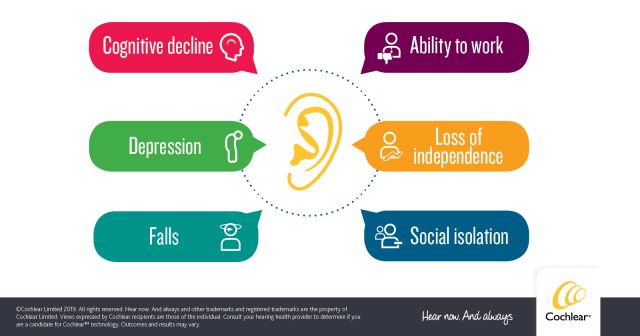According to the World Health Organization (WHO), 5% of the world’s population, 466 million people, have a disabling hearing loss. They estimate by 2050, this number is expected to rise to over 900 million people or one in every 10 people.1 As the incidence of hearing loss continues to increase, clinical evidence supports early intervention for cochlear implantation. Shortening the duration of hearing loss by implanting before hearing loss progresses to profound within approved indications can maximize outcomes, increase outcome predictability and promote health and quality of life.2 Moreover, as cognitive decline becomes increasingly relevant within our aging population, hearing loss may be shifting from something we cope with and manage to something we recognize and treat.
Many people believe that cochlear implants are only indicated for those with severe to profound hearing loss and only once hearing aid benefit is gone. However, this notion is no longer true due to the expanded adult indications for cochlear implants. Cochlear implants are indicated for treatment of adults with moderate sloping to profound hearing loss. Even the most advanced or best-fit hearing aids may not be enough. In fact, Balkany et. al showed that 20% of hearing aid users are struggling.3 This population may still receive benefit from cochlear implants. Cochlear implants provide an alternative for patients who want to improve their hearing health instead of continuing to struggle with hearing aids or waiting to progress to deafness. For patients who score less than 40% on open-set word tests, there is a high likelihood they will benefit from a CI.4
 Cochlear implants can improve quality of life and overall health of recipients. Better hearing with a CI can increase a patient’s overall quality of life, allowing them to regain confidence in social situations. In 19 clinical studies that measured quality of life for adults after cochlear implantation, all reported a significant improvement.5 Hearing health with a cochlear implant could also lead to better overall health. For patients with severe to profound hearing loss, cochlear implantation has been associated with reduced anxiety and depression and improved overall health.6
Cochlear implants can improve quality of life and overall health of recipients. Better hearing with a CI can increase a patient’s overall quality of life, allowing them to regain confidence in social situations. In 19 clinical studies that measured quality of life for adults after cochlear implantation, all reported a significant improvement.5 Hearing health with a cochlear implant could also lead to better overall health. For patients with severe to profound hearing loss, cochlear implantation has been associated with reduced anxiety and depression and improved overall health.6
For seniors, considering cochlear implantation treatment for hearing loss is especially important. As we start to better understand the link between disabling hearing loss and cognitive decline, social isolation and depression, there is growing evidence of the superior outcomes of cochlear implants over hearing aids for people with severe hearing loss (>70dB).7 Cochlear implants may also slow age-related cognitive decline with improvements seen in verbal memory after surgery.8
“A lot of people ignore hearing loss because it’s such a slow and insidious process as we age. Even if people feel they are not affected, we are showing that it may well be a more serious problem.”
– Frank Lin, M.D.


